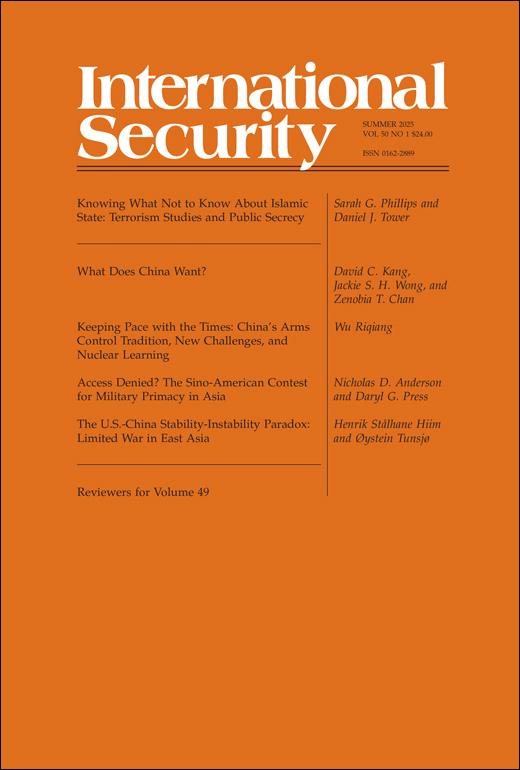
作者/Author(s): Henrik Stalhane Hiim and Oystein Tunsjo
網站來源/Source: International Security, Vol. 50, No. 1
日期/Date: 夏季/2025
關鍵字/Keywords: 戰爭、地理、科技、美中
摘要:
雖然大家都知道核升級的風險,但「穩定—不穩定悖論」顯示,美中兩國若因台灣問題爆發常規戰爭,動用核武的可能性比冷戰時期的歐洲更高,但這並不代表美中衝突或核戰爭很快會發生。
- 除了嚇阻之外,國家行為者也可能以有限的核攻擊來展現決心、迫使對手退讓或達成具體軍事目標。
- 在美蘇冷戰期間,維持「有限」核衝突的可能性很低,一旦爆發核戰,幾乎就是毀滅性打擊。此外,雙方薄弱的指管通資體系,導致核打擊精準度不足,進而限制了未來和平努力的空間。靠著這些因素制約,美蘇雙方最終沒有爆發核戰爭。
- 隨著地理差異與技術進步,當今東亞發生有限核武的風險反而比冷戰時期更高:
- 主要衝突區在海上,多數軍事目標遠離人口密集區,可有效降低平民傷亡。
- 打擊技術不斷進步與低當量核武的出現,讓中美雙方得以更精準地攻擊目標,避免大規模平民傷亡。
- 美中雙方只有在認定核武使用的收益大於代價時,才會訴諸有限核武的手段。然而直到現在,雙方都認為涉入有限核衝突的代價遠大於利益,因此不願率先發動戰爭。
- 另一個隱憂是,若中美爆發衝突,誰會先動用核武。
- 中國雖奉行不率先使用核武的政策,但採取「必報」立場。然而美國分析師認為,中國可能威脅發動有限核攻擊以展現對台決心、打擊東亞地區的美軍設施或艦艇,或在部署常規武器後動用核武庫存。
- 中國戰略家亦擔心美國可能率先動用核武,尤其如今東亞軍事平衡日益傾向中國之際。此外,美國核戰略本身就承認在「極端情況下」為了保護美國或其盟友的核心利益,可以率先使用核武先發制人。
- 部分美國軍事規劃者支持能先發制人的有限度核武,認為此舉能迫使北京退讓,且美國具備核優勢與控制損害的能力。然而,多數專家相信,中國即使遭受核攻擊也不會退讓,反而會進行報復,進一步升高衝突。此外,美國為了台灣打一場有限核戰爭未必值得,還會引發美國東亞盟友的強烈疑慮。因此,美國更傾向依賴常規手段應對台海衝突。
Summary:
Although the risks of nuclear escalation are known, the stability-instability paradox suggests that the intentional use of atomic weapons in a conventional war between China and the US over Taiwan is more possible than in the Cold War Europe. However, it does not suggest that a US-China conflict or a nuclear war is imminent.
- Apart from deterrence, a state actor could threaten or use a limited nuclear strike to demonstrate resolve, compel its opponent to back down, or achieve concrete military objectives.
- During the US-Soviet Cold War, there were few prospects for keeping a nuclear conflict limited, and a nuclear war would have been highly devastating. Furthermore, both sides had weak command and control systems, making nuclear strikes inaccurate, thereby restricting efforts to make peace in the future. Due to these constraints, the US and the Soviet Union did not engage in a nuclear war.
- Geographical differences and technological advancements increase the risks of a deliberate limited nuclear use in East Asia today than during the Cold War.
- Due to the maritime geography of the central conflict area, most military targets are located away from population centers, thereby limiting civilian casualties.
- Improvements in precision technologies and the introduction of low-yield nuclear weapons allow both the US and China to attack military targets precisely while avoiding harming civilians.
- The US and China will only resort to limited nuclear use if they perceive the incentives outweigh the costs. However, as of now, both sides face more disincentives than benefits in engaging in a limited nuclear conflict and are reluctant to initiate a war.
- Another concern is whether China or the US will be the first user of atomic weapons in their conflict.
- China has a no-first-use pledge policy regarding nuclear weapons, but it had an "assured retaliation" stance. However, US analysts believe China could threaten limited nuclear attacks to show resolve over Taiwan, attack US military installations or vessels in East Asia, or use its nuclear inventories once it deploys its conventional weapons.
- Chinese strategists also worry that the US may use nuclear weapons first, especially since the military balance in East Asia increasingly favors China over the US. Furthermore, the US has a nuclear doctrine that agrees on the first-use of nuclear weapons in extreme circumstances to protect the US's or its allies' vital interests.
- Some US military planners support a limited nuclear first-use because they believe it is necessary to compel Beijing to back down, and the US has a nuclear superiority and damage limitation capability. Yet, most experts believe China will not back down despite nuclear attacks and will retaliate, escalating the conflict. Moreover, a limited nuclear conflict over Taiwan may not be worth it for the US and would cause concerns among US East Asian allies. Therefore, the US would prefer to rely on conventional methods in the event of a conflict over Taiwan.
